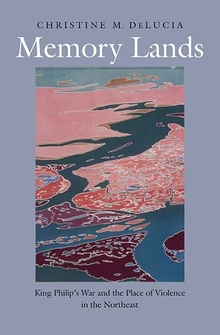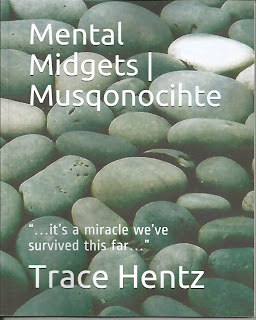Memory Lands | Violence and Indigenous Communities
Christine M. DeLucia, Memory Lands: King Philip’s War and the Place of Violence in the Northeast (New Haven and London: Yale University Press, 2018).
Citation:
Encompassing centuries of ancestral
Algonquian history, Memory Lands offers a revolutionary rewriting of
history via the study of topophilia — women’s and men’s senses of place,
and their attachment to place — to offer an ethnohistorical account of
how Algonquian communities have reconstituted their experience as
colonized people. Most impressively, DeLucia makes these moves in order
to forefront Algonquian peoples’ understanding of memory, loss, and
history. Focusing on the conflict known as King Philip’s War, the book
provides astute analysis of how Algonquian people commemorated this
event, and how English colonizers and their descendants simultaneously
maintained their own narratives of it in ways that served to erase
Indigenous history. Drawing upon material objects, oral histories,
archaeological data, proceedings of memorial associations, newspapers,
photographs, diaries, property documentation, and local government
records, Memory Lands offers an unconventional and revealing
configuration of history that allows the author to demonstrate that
there are sites where people make memories, and places where they
grapple with history, and that these sites shape our understanding of
change over time. A breathtaking study of remembrance and place which
lies at the intersection of multiple fields, Memory Lands offers a major
contribution to American Studies, US History, North American
Ethnohistory, and Memory Studies.
This heady, powerful book urges us to rethink the ways that we practice history, especially of topics that are simultaneously so painful and so important.
** coming in 2021
Violence and Indigenous Communities: Confronting the Past and Engaging the Present
In contrast to past studies that focus narrowly on war and massacre, treat Native peoples as victims, and consign violence safely to the past, this interdisciplinary collection of essays opens up important new perspectives. While recognizing the long history of genocidal violence against Indigenous peoples, the contributors emphasize the agency of individuals and communities in genocide's aftermath and provide historical and contemporary examples of activism, resistance, identity formation, historical memory, resilience, and healing. The collection also expands the scope of violence by examining the eyewitness testimony of women and children who survived violence, the role of Indigenous self-determination and governance in inciting violence against women, and settler colonialism's promotion of cultural erasure and environmental destruction. By including contributions on Indigenous peoples in the United States, Canada, the Pacific, Greenland, Sápmi, and Latin America, the volume breaks down nation-state and European imperial boundaries to show the value of global Indigenous frameworks. Connecting the past to the present, this book confronts violence as an ongoing problem and identifies projects that mitigate and push back against it.







Comments
Post a Comment
Please leave a comment or use the contact form (which is private)